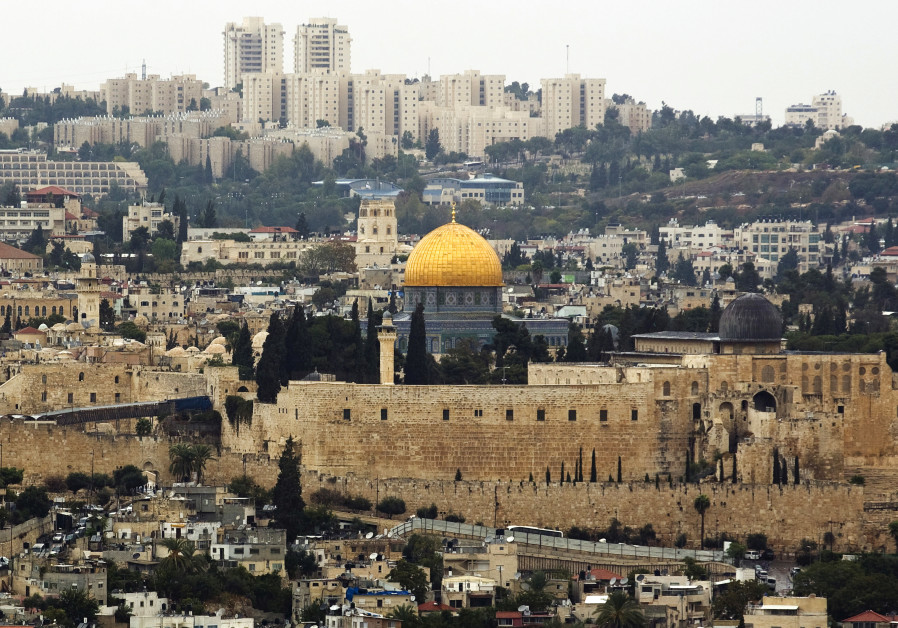148 NATIONS DISAVOW JEWISH TIES TO JERUSALEM, TEMPLE MOUNT
“The international community must stop participating in such a blatant denial of history. You must not permit these blatant attempts to delegitimize Israel,” Furman said.
DECEMBER 2, 2018 00:57
3 minute read.

A general view of Jerusalem's old city shows the Dome of the Rock in the compound known to Muslims as Noble Sanctuary and to Jews as Temple Mount, October 25, 2015. (photo credit: AMIR COHEN/REUTERS)
The UN General Assembly in New York on Friday approved six anti-Israel resolutions including two that ignored Jewish ties to the Temple Mount.
The primary resolution on Jerusalem, that passed 148-11 with 14 abstentions, also disavowed Israeli sovereignty in Jerusalem.
Both that text and a second more global one on the Israeli-Palestinian conflict, which passed 156-8, with 12 abstentions, spoke of Judaism’s most holy site – The Temple Mount – solely by its Muslim name of al-Haram al-Sharif.
The primary resolution on Jerusalem, that passed 148-11 with 14 abstentions, also disavowed Israeli sovereignty in Jerusalem.
Both that text and a second more global one on the Israeli-Palestinian conflict, which passed 156-8, with 12 abstentions, spoke of Judaism’s most holy site – The Temple Mount – solely by its Muslim name of al-Haram al-Sharif.
The votes comes as Israel is working to shore up international support for its sovereignty in Jerusalem.
A third text, which was approved 99-10 with 66 abstentions, called on Israel to withdraw from the Golan Heights.
The United States, Canada and Australia voted against all six resolutions, which are the first batch of some 20 resolutions that the UNGA annually passes against Israel.
“We live in a time of many crises, crises that are raging around the Middle East and around the world. It is a shame that rather than addressing these crises, the UN passes so many biased resolutions,” said Israeli Deputy Permanent Representative Noa Furman.
She said she was particularly concerned by the two resolutions that ignored Jewish and Christian ties to the Temple Mount.
“This omission was deliberate. It shows yet another instance of the Palestinian refusal to recognize the proven historical connection between Judaism, Christianity, the Temple Mount and Jerusalem as a whole.
“The international community must stop participating in such a blatant denial of history. You must not permit these blatant attempts to delegitimize Israel,” Furman said.
The European Union, which supported both texts, warned it could stop doing so unless more include language was used to reference holy sites in Jerusalem.
Speaking on behalf of the EU, the Austrian representative said the EU stresses “the need for language on the holy sites of Jerusalem to reflect the importance and historical significance of the holy sites for the three monotheistic religions.”
It added, “future choice of language may affect the EU’s collective support for the resolutions.”
PLO Ambassador to the UN Riyad Mansour thanked UN member states for their support of texts that reference a two-state resolution to the conflict based on the pre-1967 lines with east Jerusalem as the capital of a Palestinian state.
This “global consensus, which all of us have worked for, is still the cornerstone of finding a just and lasting peace to the conflict.”
US representative Leslie Ordeman, who is deputy political coordinator, also spoke out against the texts.
“We are disappointed that despite messages of support for reform, member states continue to single out Israel with these resolutions.
“As the United States has repeatedly made clear, this dynamic is unacceptable. Again, we see resolutions that are quick to condemn all manner of Israeli actions, but say almost nothing about Palestinian terrorist attacks against innocent civilians. This is particularly acute now, when the rocket attacks on November 12 saw more projectiles fired on a single day than on any day since 2014.”
Both Israel and the US took issue in particular with the two resolutions passed Friday that continued to support the work of the “Committee on the Exercise of the Inalienable Rights of the Palestinian People” and the “Division for Palestinian Rights.”
“The Palestinians are the only actor in the UN system with a dedicated division within the UN Secretariat. The message that it sends is that the Palestinians never need to come back to the negotiating table – they can rely on flawed and biased mechanisms, such as these, to push their agenda,” he said.








No comments:
Post a Comment